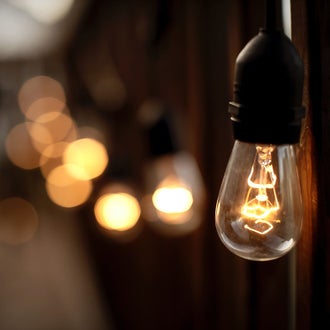Di from Byron Bay asked:
I read that scientists are saying halogen light bulbs emit UV radiation which can cause skin cancer. The article also says that a glass or plastic cover over the bulb will eliminate the risk. Are these claims true?"
Halogen lightbulbs are safe to use without worrying about the risk of cancer.
Let’s take a look at this one in a little more detail. While it is true that some halogen and fluorescent light bulbs emit UV radiation (UVR), these emissions are low, especially when installed in ceiling fittings. UV emissions from all light bulbs and lamps decrease rapidly with distance from the bulb.
The Government’s Australian Radiation Protection and Nuclear Safety Agency (ARPANSA) conducted a study into a range of light bulbs and found that the halogen lamps tested produced insufficient UV radiation to be hazardous, even at a close distance of 10cm. Furthermore, a glass or plastic cover or shade placed over the bulb can further reduce exposure to UV radiation.
Fluorescent lights are also considered safe. ARPANSA investigated these lights for UVR safety and found that:
“Compact fluorescent lights (CFLs) emit slightly more UVR when compared to other light sources like halogen and incandescent light sources.”
However, they concluded that:
“There is no established evidence that the low levels of ultraviolet radiation (UVR) from compact fluorescent lights (CFLs) are a risk to health for normal population skin types.”
The UVR emitted by some halogen and fluorescent lightbulbs is very low, therefore they are considered safe and can be used regularly.
Although halogen and fluorescent lightbulbs are safe to use, some everyday activities, such as using UV lamps in nail salons require protection from UV radiation. Of course, remember to always stay protected when out in the sun and the UV Index is forecast to reach 3 or more.
iHeard hub
Thank you for joining the mission against misinformation
If you’ve heard a rumour about cancer, or are unsure about information you’ve read online, ask your own cancer question via the iHeard hub.
We want everyone to have the correct information about cancer so if you know anyone else with a cancer question, why not let them know about iHeard?
Sources: Compact fluorescent lights and health | ARPANSA
Author: Claire Wharton, Writer, Cancer Council Australia
Article reviewed by: Dr Amelia Smit, Research Fellow (Melanoma and Skin Cancer), The Daffodil Centre, The University of Sydney

